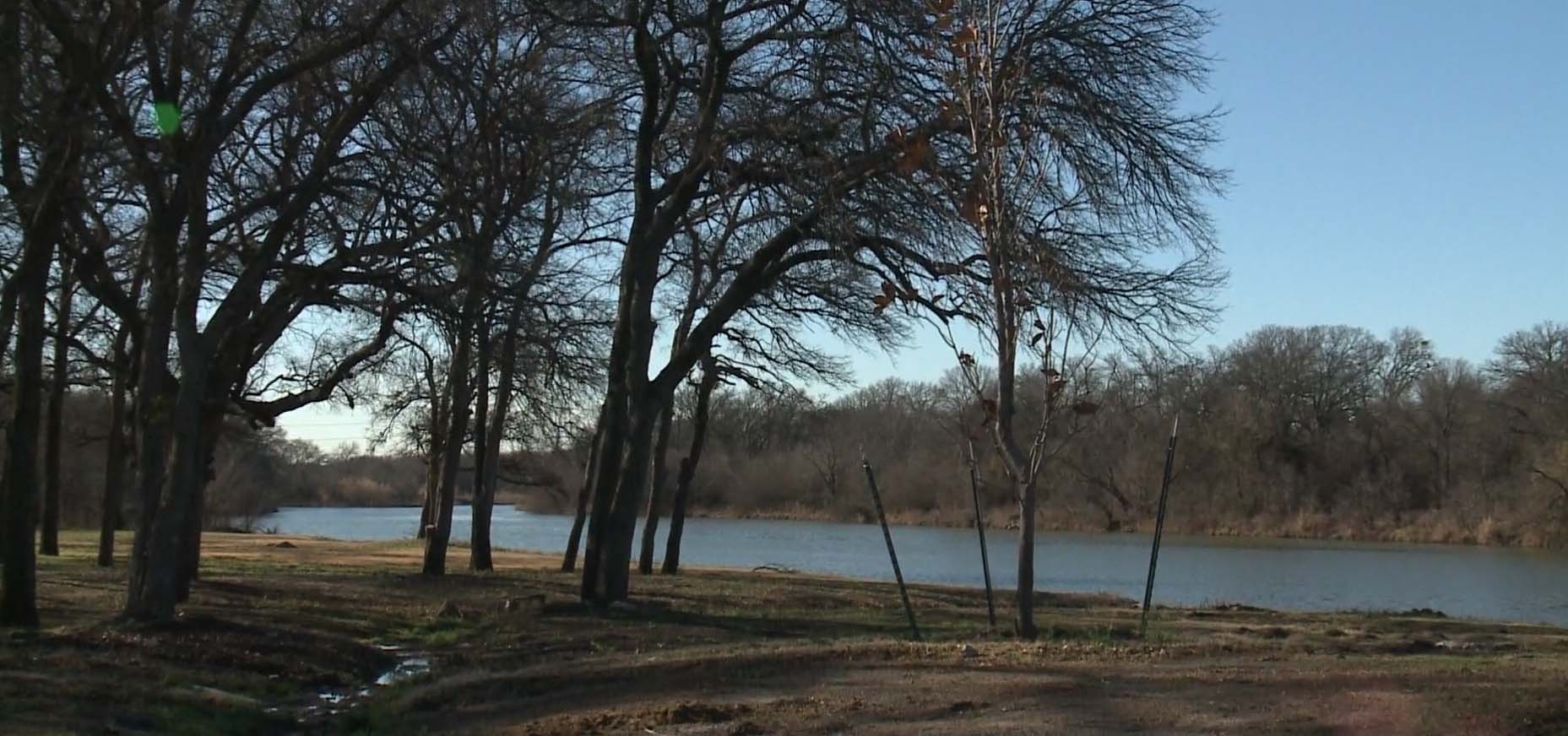Posts Tagged ‘Mayor Mike Rawlings’
What Wednesday’s Vote Means for Dallas, the Shale, and the Rest of the Universe
 Wednesday's vote on the Trinity East permits was not only an historic one. It's a long overdue turning point.
Wednesday's vote on the Trinity East permits was not only an historic one. It's a long overdue turning point.
The bloody knuckle political fight over urban gas drilling in Dallas in 2013 is the fight local environmentalists owed Fort Worth in 2006. Our collective failure in Cowtown gave the gas industry a too-friendly template for every other DFW city that's come after Fort Worth's gas rush.
Wednesday that template got tossed. A clearly frustrated Trinity East lobbyist complained that the company wouldn't even have had to participate in a Council hearing like this one if the same permits were being sought in Fort Worth. Welcome to Big D.
We can't undo old wrongs, but we can start changing the pattern of behavior that keeps churning out new ones. Wednesday's vote by the Dallas City Council was, by far, the highest-profile rebuke of the gas industry in a region it thinks its owns lock, stock and barrel. As he Dallas Morning News put it, "the defeat could be the death knell for natural gas drilling in a city known around the world for its ties to the petroleum industry." Politically, we aren't in Fort Worth anymore.
So what else is new after yesterday? From micro to macro:
From just a basic civics perspective, it's hard not to be impressed with the job that residents did in mobilizing themselves into a persistent and contentious force for change. This wasn't just an environmental victory. It was a victory for grassroots organizing. Residents had to fight not only the gas industry, but Dallas City Hall staff and the Mayor, who were all doing their best to rig the process in Trinity East's favor. Moreover, they had to fight on multiple fronts at the same time, both within the regulatory process to deny the permits outright, and in the Spring's city council elections to make sure they had the votes once the permits got to the horseshoe on Marilla. And oh yeah, they've had to put together and lobby for the toughest regulations to be included in a new ordinance being written, also at the same time.
That said, the last nine months have seen the biggest show of green political muscle in the city's history. If you total up the numbers of people involved, throw in a scandalous secret memo that brings down a City Manager, add triumphs in half the council elections you enter, and pile on winning-over the local conservative daily newspaper, then there's just no comparison. The momentum carried into Wednesday's meeting when opponents got two more votes than the four that were needed to block the permits, for a total of six. That's a far cry from the two or three everyone was sure about when this started last winter. We've seen the Dallas environmental movement grow up right before our eyes into something nobody, including environmentalists, thought it was capable of being when this started.
The fruit of this new growth was on display at City Hall (Coverge from the DMN, KERA, CultureMap and the Observer). There's no precedent for the kind of coalition that turned-out, except maybe the anti-Trinity Tollroad coalition that almost upended the Citizens Council's plans for solar-powered water taxis and riverside freeways in the 1990's. There were West Dallas residents from La Bajada, Oak Cliff dwellers, North and East Dallas homeowners association presidents, Students, teachers, professionals, gas lease owners, environmentalists, neighborhood activists, an Irving city council member, young mothers, young grandmothers and everything in between. Reflecting this diversity was a Council coalition that included both Hispanic Council members, Adam Medrano and Monica Alonzo, African-American Carolyn Davis, newcomer Philip Kingston, and stalwarts Sandy Greyson and Scott Griggs. If this alliance of interests holds together, it stands a very good chance of getting a strong new ordinance in the coming months.
And what about that new ordinance? With the old business of Trinity East now concluded, all attention is directed at Dallas writing and passing the most protective gas drilling ordinance in the Barnett Shale by the end of the year. The chances of that happening went up dramatically with Wednesday's vote.
One of the most unexpected results coming out of the confrontation was Mayor Rawlings' seemingly blunt declaration that he was four-square against urban drilling in Dallas. Saying the city could afford to be picky about the kind of development it seeks, he stated he didn't think gas drilling was a good match for Dallas and looked forward to passing a strong new ordinance. We'll see. Actions speak louder than words, and so far the Mayor's actions on this issue have all been in service to approving the Trinity East permits. With that fight resolved, can he be trusted to embrace a new philosophy? We'll be able to tell soon enough with a draft ordinance due to be delivered by the Plan Commission to the Council in late September. At any rate, his public confession on Wednesday is another sign of how far the Dallas movement has come. It's impossible to imagine Fort Worth Mayor Betsy Price uttering the same words.
It also gives the new members of the City Council some cover to vote for tougher regulations as well. Rumor has it that Jennifer Staubach-Gates was agonizing over the Trinity East vote even as she entered the Council Chambers. She eventually voted with the Mayor but as an ex- school nurse who's dealt with asthmatic kids firsthand, she's concerned about air pollution and other public health consequences of fracking. The Mayor's coming out against drilling in Dallas may embolden her and others to get on the band wagon. Rawlings' statement also sets a high bar for the slew of Mayoral candidates coming up in the next election cycle.
Residents now must focus on the last two Plan Commission meetings and hearings that are deciding what kind of new gas drilling ordinance Dallas will write. And they represent very full plates of issues indeed:
On Thursday, September 12th, at 8:30 am the Commission will begin work on the topics of "Air Quality," "Water," "Pipelines" and "Compressor Stations" in their morning workshop. At 1:30 pm that same day they'll get around to holding another one of their unique (anti-public) public hearings at City Hall on those same subjects. It's vital that residents remain plugged into this process and show up to speak on these incredibly important issues.
Just as opponents all got behind the idea of 1,500 foot setbacks and made it a mantra, we no need to coalesce around three or four central and simple concepts for the 12th including: 1) Air Pollution Off-sets, 2) Special Zoning Districts for Compressors, and 3) much higher water rates for taking water permanently out of the hydrological cycle.
– Off-sets would require that gas operators estimate how much new greenhouse gas (GHG) pollution they'll emit into the air every year based on EPA numbers and their own self-reporting, and then off-set those increases in air pollution by paying for pre-approved air pollution control projects in Dallas that would reduce pollution. If you expect to release 5 tons of emissions from your gas operations, you will have to pay for reducing five tons of air pollution in the city by electrifying a car fleet, improving energy efficiency measures in homes and buildings, putting more bikes on the street and so forth. In this way, off-sets also act as a strong incentive to decrease emissions as much as possible at the sources themselves. The less you pollute i nthe first place, the less you have to pay to off-set that pollution.
Unlike every other heavy industry that does business in a smog "non-attainment" area such as DFW, the gas industry is exempt from having to do this at the federal level. So we want Dallas to be the first city in the nation to fix that loophole by requiring local off-sets. This would be a precedent-setting piece of policy-making that citizens could then take to other Barnett Shale cities and counties. A grassroots regional policy could grow out of the Dallas template – much like it did when Dallas passed the first "green cement" procurement policy in 2007. That campaign lead to the eventual closing of all seven old wet kilns in Midlothian and millions of pounds of air pollution permanently eliminated. It forced the cement industry to clean up. We want to do the same thing with the gas industry and offsets.
This new policy could be the beginning of a tool that we can use to significantly reduce gas industry air pollution, not only in DFW, but in smoggy metro areas throughout the U.S. that now also host gas drilling, like Denver, Pittsburgh, and Los Angeles.
– Compressor Stations are the big league polluters of the natural gas fuel cycle, running 24/7 365 days a year and emitting voluminous amounts of air pollution. Some compressor stations release more Volatile Organic Compounds than the Midlothian cement plants and they're huge greenhouse gas polluters. A recent study from the Houston Advanced Research Center found that a single flare or compressor could raise downwind smog levels by 3-5 parts per billion or more within five miles. Compressors should be required to get their own Special Zoning District with strict rules on sound, pollution and setbacks.
– Water is precious in NorthTexas and industries that take it permanently out of the hydrological cycle should pay more than those that don't. A lot more, because it means we have to go out and find that water anew. Likewise, during drought conditions, water should be for drinking, not fracking. It's critical we make the industry pay for the real costs of using so much of this absolutely necessary resource and then throwing it away for good down a hole.
On Thursday September 26th the Plan Commission will hold its final public hearing on the new gas ordinance. Then it will vote on a draft to send the City Council. Again, citizens need a good turnout for sending this document off, whether it has everything in it we want, or it's lacking in some important way. We need to be there.
We are only these two September hearings away from showing up at the Dallas City Council with the most protective gas drilling ordinance in the Barnett Shale and providing the region and the country a new alternative for the obsolete Fort Worth model.
If you came down to City Hall, if you e-mailed, or phoned or wrote – Thank you for your contribution to the fight. It took exactly the amount of effort you and everyone else gave to make Wednesday's victory happen. It will take it again to pass a great ordinance.
But stick with us. We're making history.
Morning News Takes Strong Stand Against Trinity East Permits; Only 24 Hours to Send Your E-Mails of Opposition
 It's become so common place these days that you're likely to take it for granted, but if you'd ask activists three years ago whether we'd end up carrying the Dallas Morning News on the issue of urban gas drilling, you would have been considered a dreamy-eyed do-gooder.
It's become so common place these days that you're likely to take it for granted, but if you'd ask activists three years ago whether we'd end up carrying the Dallas Morning News on the issue of urban gas drilling, you would have been considered a dreamy-eyed do-gooder.
But in fact, across the board, from Trinity East to the new ordinance, from compressors to setbacks, the News editorial page has been leading public opinion in favor of common sense, transparency and caution ever since the City's Task Force began meeting in 2011.
That leadership continues with today's blunt recommendation to deny the Trinity East permits. Below is the entire editorial in its entirety, which contains as good a synopsis and talking points about the situation as you'll find.
Meanwhile we only have 24 more hours to fill-up the City Council's mail boxes with your messages of opposition to these awful permits. Please click here to take you to our automatic e-mail system or see this alert for the Council's e-mail addresses. Then join us downtown at City Hall tomorrow afternoon at 12:30 pm for the historic vote and come celebrate with us at Lee Harvey's afterwards.
Editorial: Dallas City Council, vote no on gas drilling plan
After months of sidestepping the issue, the Dallas City Council now must do the right thing Wednesday — deny Trinity East’s application for permits to drill on parkland and flood plains around the Elm Fork of the Trinity River.
This shouldn’t be a difficult vote. The Dallas Plan Commission twice considered and rejected the permit application — the correct vote because existing city policy bars drilling on the surface of parkland. Now the City Council should step up and also reject Trinity East’s proposal.
In 2008, the city sold lease rights to drill on city-owned land to Trinity East for $19 million and used the money to help balance the budget. It was an ill-conceived decision, prematurely pushed through for budgetary reasons before city officials had decided how they would regulate drilling within city limits.
Due to low prices for natural gas, the project remained dormant until Trinity East revealed plans late last year to build a compressor station and drill on the surface of parkland. The controversy heightened this spring when news broke that former City Manager Mary Suhm had privately told Trinity East she would help it win the right to drill on parkland at the same time she was publicly assuring the council that she would not support drilling on city parkland. The proposal became such a tangled mess that this editorial board sharply criticized City Hall for lack of transparency and due diligence and urged denial of Trinity East’s application.
Trinity East needs 12 of the 15 council votes to override the Plan Commission decision and grant the drilling permits. Council members Scott Griggs, Philip Kingston, Sandy Greyson and Adam Medrano are solidly on record against the proposal, and at least two others, Carolyn Davis and Monica Alonzo, indicated in The Dallas Morning News Voter Guide last spring that they opposed gas drilling.
We hope the council has learned from this debacle and will deliver a “no” vote Wednesday.
The Trinity East proposal is the wrong plan at the wrong time. Before City Hall considers another drilling proposal from any company, officials must transparently develop a tough new drilling ordinance that protects Dallas neighborhoods. The Plan Commission is in the process of writing an ordinance that, among other things, we hope provides safe setback distances from homes and schools, addresses water use in droughts and continues the ban on gas drilling on the surface of parkland.
Gas drilling can be done safely in an urban area if the proper safeguards and setbacks are adopted. Dallas needs to deny the Trinity East plan and then take the time to write rules that are in the best interest of all residents.
After You Allow It, How Will You Police It?
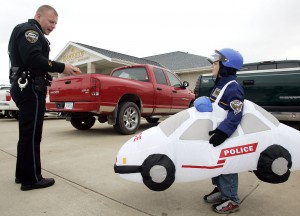 Not very well, if you're allowed to do it in Texas. The prolific Peggy Heinkel-Wolfe has the story of why a fracking well blow-out in the middle of Denton got such a slack response from all those who were supposed to be protecting the public from these kinds of things.
Not very well, if you're allowed to do it in Texas. The prolific Peggy Heinkel-Wolfe has the story of why a fracking well blow-out in the middle of Denton got such a slack response from all those who were supposed to be protecting the public from these kinds of things.
One huge problem with the new Dallas gas ordinance is that it will require a multi-staffed new Office of Gas Inspections available to answer calls 24/7. Time and again, City Hall staff's response to questions about who's going to be responsible for enforcing the regs of the ordinance is simply, "The gas inspector will do that."
But no one at City Hall has a clue how much that would cost, what it would entail or how soon it would be established if ever. Not a single council person has advocated funding for such an office. So you know, we're all in favor of fracking, but regulating the stuff, not so much.
Moreover, the actual City of Dallas department that would host such a position, the Office of Environmental Quality, has been completely MIA in all the proceedings of the last year – ever since the 2011 Task Force went out of business last February or so. No input has been provided or requested from the OEQ to better understand how this new bureaucracy is supposed to work.
You can't rely on EPA. They have nobody in the field to help. You can't rely on the state – as Peggy's story makes clear. And Dallas can't be bothered to think about these things now while they're still busying themselves trying to make a land swap with Trinity East so it can get the company its permits. Like everything else about drilling in Dallas under Mike Rawlings and the still-hovering Mary Suhm, all other details, problems, policies, etc have to take a back seat to fulfilling the secret deal Trinity East and the City made. Nothing else matters until these permits are in place. Those are the priorities at City Hall today.
City Hall Apparatchiks Rewrite History, Now Say 1500-Foot Setback Vote Never Happened
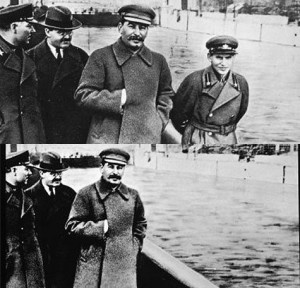 Any doubt that Dallas City Hall is more interested in protecting the Trinity East gas leases than Dallas residents as it writes a new gas drilling ordinance was surely removed yesterday when City Attorney Tammy Palomino flatly lied and told City Plan Commission members that they had not decided on a 1500-foot setback, or buffer zone, between homes and other "protected uses," even though they had done precisely that at their June 20th meeting.
Any doubt that Dallas City Hall is more interested in protecting the Trinity East gas leases than Dallas residents as it writes a new gas drilling ordinance was surely removed yesterday when City Attorney Tammy Palomino flatly lied and told City Plan Commission members that they had not decided on a 1500-foot setback, or buffer zone, between homes and other "protected uses," even though they had done precisely that at their June 20th meeting.
Employing the Orwellian language of a Soviet history writer, Palomino simply choose to ignore the results of a decision she didn't like and pretend the vote never happened. She argued that there was "no consensus" on the CPC for a 1500-foot setback – even though that very word was used to describe the results of June 20th meeting by CPC members themselves, as well as the media.
Instead, she handed out an official "summary" of CPC drilling recommendations to-date that not only only didn't include ANY mention of the 1500-foot setback decision, but instead listed a 1000-foot setback limit that had specifically been rejected by the Commission!
That missing footage is critical. 1000-foot setbacks, with a variance (or exception) up to 500-feet, were recommended by the city's gas drilling task force, but we now know those recommendations were tailored to fit the circumstances of the Trinity East lease sites along the Trinity River in northwest Dallas. That is, with a variance that could put wells 500 feet from homes, the Trinity East sites could be approved. With the CPC's 1500 foot-setback, there's only a variance to 1000 feet. That makes it impossible for Trinity East to set up shop where they want. And that's why Palomino deliberately, but unethically, left the 1500 setback out of her "summary."
The problem for Palomino in trying to pull this kind of disappearing act is that there were way too many witnesses to the original vote, including reporters. According to KERA's account "One of the first changes that grabbed consensus of the Plan Commission was an increase to the buffer zone or setback between gas wells and homes, businesses, schools, and recreational areas. Plan Commissioners want 1500 feet, not the 1,000 recommended by the task force." Channel 4 reported the same thing. There's also the fact that the city archives audio tapes of every CPC meeting, and citizens have have begun to videotape the meetings to catch this kind of bullying by staff.
What all of this will show is that on June 20th CPC member Paul Ridley took great pains to clarify that the CPC had indeed reached a consensus that they wanted a 1500 foot setback – considered the most protective setback currently used by any North Texas city. He even asked the question, "Do we have consensus on this?" and heads all nodded and not one verbal objection can be heard – other than from Tammy Palomino – who is stuttering that the city attorneys are going to have to make sure they can do this (no explanation of why Dallas can't). There's no question about what happened.
Which is why even the most cynical observers were shocked at the clumsy effort by Palomino to erase the decision from history by way of her "summary." It's like the City can't pass up an opportunity to create an ethical crisis whenever it deals with the Trinity East leases.
All the video and audio tape is being assembled into a nice neat package for the public and media. The case against Tammy Palomino will be devastating. As a result of her premeditated misrepresentations, Palomino should resign, or at the very least be re-assigned away from work on the new gas ordinance. She's representing Trinity East in these proceedings, not the citizens of Dallas.
Yesterday's episode was but the most extreme example of the kind of bullying and steamrolling that staff is employing against the CPC to end up with an ordinance that is Trinity East-friendly. As they have for the past three years or so, they're contorting the system to make it fit Trinity East's permits.
Besides the setbacks issue, staff really wants the CPC to OK gas drilling in parks, and a majority of CPC members today were willing to say out loud they supported that goal. That's right – after 7 months of crowds filling city hall to protest drilling in parks, Official Dallas is still moving toward approval of that idea. It's based on the idea of "unused" park land – a concept that has never been defined by the city or anyone else.
Trying to further this goal, staff actually came to Thursday's meeting with a US Parks Department definition of "active" and "passive" park land with the idea that Dallas could adopt something similar and allow drilling on the "passive" acreage. According to the list, "passive" park land is defined as land used for hiking, rock climbing, horseback riding, mountain biking, and camping, among others activities. Sounds pretty "active" doesn't it? Despite their propensity to allow park drilling it struck the CPC the same way and they firmly rejected staff's approach. Still, just like the 1500 foot setback issue, staff won't be satisfied until they get Trinity East what it wants.
Which brings us to a hard truth that the media and the public need to absorb. As bad and blatant as it is, Tammy Palomino's unethical behavior is only a symptom of a much larger rotten problem with this entire gas drilling ordinance process that has been present from before the task force was created right up until now. It's impossible for staff to both be advocates for the Trinity East leases in the writing of a new gas ordinance and give objective counsel to the CPC and Council on how to write the most protective ordinance. They cannot serve two masters.
Palomino and others have been told they need to find a way to make sure Trinity East gets what it wants in this new gas drilling ordinance. That makes city staff just another lobbying arm of Trinity East, not honest brokers trying to produce the best and most protective policy for Dallas residents. Every piece of advice they give is meant to further the leases, not the public good.
Because of this fact, an independent counsel needs to be brought in for the purpose of helping draft this new gas drilling ordinance. Policymakers need to have the best information, the most objective information, if they're going to make good policy. They're not getting it from city staff when it comes to drilling.
It's time to quit pretending this isn't a big problem. When city attorneys start trying to erase public policy decisions because they conflict with a private interest they're serving, the system is no longer working. It's corrupt and must be replaced before that corruption is allowed to spread.
Stay tuned. You're going to be hearing a lot more about this.
Scheduling Note: Although the CPC released a schedule for its work on the drilling ordinance only last week, including three public hearings, things may be changing quickly with additional workshop times and different dates and times for hearings. There was a lot of talk about schedule changes on Thursday, but nothing was decided. Right now the first opportunity for you to express outrage at this latest development is a public hearing slated for August 15th, 4 to 6 pm, at City Hall but stay tuned to make sure.
It’s Official: Trinity East Zombie Permits Coming Back; Dallas Gas Ordinance Rewrite Schedule Released – 1st Public Hearing August 15th
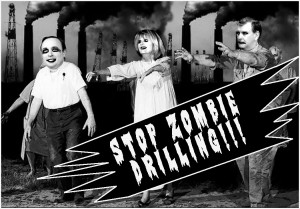 They just won't take a big fat public "No!",
They just won't take a big fat public "No!", or two, or three, for an answer.
We've learned form sources inside City Hall that Trinity East – with a big assist from City of Dallas staff and Mayor Mike Rawlings – is preparing to once again attempt to permit its three proposed drilling and refinery/compressor station sites along the Trinity River.
While the company and city staff keep trying to win support for a weaker new gas drilling ordinance than citizens have repeatedly requested, a deal is being wheeled that would have Trinity East trading its lease on park land for another piece of city-owned property in northeast Dallas. Meanwhile, the City is also working feverishly to firm up support for its official position that it can't possibly turn down Trinity East without losing a lawsuit – an opinion no one outside of City Hall, save Trinity East, shares so far.
Yeah, the secret gas deal that the Observer uncovered in February got City Manger Mary Suhm to finally leave the building come December, but she's not going until she gets those Trinity East sites permitted the way she promised behind closed doors.
All of which makes the writing of a brand new Dallas gas drilling ordinance even more important now. And last week the City Plan Commission released its two-month schedule of how that's going to be done (see below), complete with three (daytime) public hearings with an ETA to the City Council by October.
There will be just six more meetings of the Plan Commission to review the almost two-year old Dallas Gas Drilling Task Force recommendations and decide to take them at face value, strengthen them, or weaken them. Scatted among these will be three public hearings – the first one in a little over two weeks on August 15th from 4 to 6 pm. The Commission goal is to get a new drilling ordinance to the City Council by October, when the terms of current members expire.
That's the official agenda. The unofficial one is trying to find ways to weaken the new ordinance enough to allow Trinity East to be able to get their proposed sites permitted. There's already been plenty of evidence at previous meetings indicating how desperate staff is in trying to give their departing boss a going-away gift.
We know most of you can't come to the Plan Commission workshops on Thursday mornings to follow the nitty-gritty of how this plays out. We'll be there reporting that to you, no problem. But what we can't do is manufacture warm bodies to put in seats for those three public hearings. Please make it a point to show up at one or more of these – and in particular, the very last one on September 26th as it rolls into the City Council.
Trinity East lobbyist Dallas Cothrum is on record as saying the company's three previously proposed sites on parkland, flood plains and near a new soccer complex that have now been rejected twice by this same CPC were the "best possible" places the company could have chosen for drilling and processing. So now the battle is over the less-than-best possible places. We can't wait to see what part of town the City and Trinity will decide to sacrifice for that designation as part of their possible land-swap deal.
Making sure a new drilling ordinance is the most protective it can possibly be is the only way left to finally drive a stake through the heart of the Trinity East gas permits. You have no idea how much we hate to ring the alarm about these damn permits again, but the stakes are very high and we're on the verge of winning one of the Barnett Shale's biggest citizen victories – if we can just keep the pedal to the metal. Bring your lead feet to the first hearing on August 15th.
Schedule for the City Plan Commission's Workshops and Public Hearings on the New Gas Drilling Ordinance
(All workshop meetings start at 9 am and take place on the 5th floor at 5ES in City Hall unless otherwise indicated. Specific Room locations for the Public Hearings at City Hall will be announced. Topic #’s refer to the Dallas Gas Drilling Task Force Recommendations Matrix.)
THURSDAY, JULY 25
9:00 am – 12 Noon CPC Workshop
• Topic 4 – Pad Site Operations
THURSDAY, AUGUST 8
9:00 am -12 Noon CPC Workshop
• Topic 9 – Gas Drilling/Well Permit
• Topic 14 – Bonding Requirements
• Topic 15 – Site Monitoring and Review of Permit Application
THURSDAY, AUGUST 15
1:30 pm – 3:30 pm Workshop
• Topic 13 – Required Plans
THURSDAY, AUGUST 15th PUBLIC HEARING: 4:00 – 6:00 pm
THURSDAY, AUGUST 22
9:00 am to 12 Noon CPC Workshop
• Topic 1 – Air Quality
• Topic 2 – Water
THURSDAY AUGUST 29
9:00 am – 10:45 am CPC Workshop
• Topic 3 – Physical Pad Site
• Topic 16 – Emergency Response
• Topic 5 – Abandonment and Restoration
THURSDAY, AUGUST 29th PUBLIC HEARING: 11:00 AM -12:00 NOON
THURSDAY, SEPTEMBER 12
9:00 – 12 Noon CPC Workshop
• Topic 10 – Seismic Permits
• Topics 6 – Pipelines and Compressors
THURSDAY, SEPTEMBER 26th PUBLIC HEARING 1:30 PM -?
(Agenda: What to recommend to City Council)
Dallas Park Driller Was Former Haz-Waste Handler Forced to Shutter California Plant for Violations
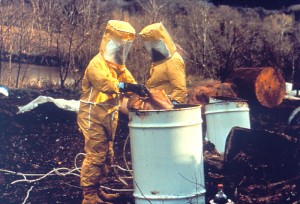 The President of the company at the center of the current Dallas drilling controversy was Vice-President and General Counsel of a hazardous waste disposal firm that was forced to close its California plant site after a long history of environmental violations.
The President of the company at the center of the current Dallas drilling controversy was Vice-President and General Counsel of a hazardous waste disposal firm that was forced to close its California plant site after a long history of environmental violations.
Thomas Blanton is President of Keystone, the parent company of Trinity East, which is applying to the City of Dallas for three gas drilling and production permits in the Trinity River flood plain near Irving. But in the 1990’s and early years of this century, he was a leading officer of the Board of Directors of US Liquids, a large broker of hazardous wastes that had its California facility ordered shut by the state’s California Department of Toxic Substances Control.
From 1999 to 2003, US Liquids owned Romic Environmental Technologies Corporation. Romic’s Bay Area operation received hazardous wastes from throughout the country, “blended” them on-site, and then shipped the toxic soup for use as “fuel” for cement plants like the TXI kilns in Midlothian.
Records show that from 1999 to 2004, Romic was slapped with 28 separate environmental violations by the State of California, which resulted in penalties of $849,500. The California Occupational Safety and Health Administration (CalOSHA), discovered 57 violations at the plant from 1988 to 2004, totaling another $163,360 in fines.
Romic closed in 2007 on orders from the state of California as part of a legal settlement stemming from a series of environmental violations. The state and EPA ordered a clean up and closure of the facility after extensive soil and ground water contamination was discovered over most of the site. According to the EPA, the contamination is primarily attributed to the spills, overflows, flooding events, and other accidental releases around the “central process area.” The primary contaminants were volatile organic compounds such as trichloroethene (TCE), a solvent used to clean metal parts. Toxins migrated as much as 80 feet below ground that borders San Francisco Bay tidal marshes.
All three sites that Blanton’s company wants to drill on are located in the Trinity River’s 100-year flood plain; two are also on City of Dallas park land. Opponents have warned about probable contamination from surface spills, which a 2011 UT study concluded were more frequent with fracking than conventional drilling.
It was recently disclosed that a Trinity East sister company experienced a casing failure at an Irving gas well it tried to drill in 2009, although the extent of any environmental damage caused by the incident remains unknown.
“Does Dallas really want hand over its park land to a businessman who has a history of contaminating and threatening soil and water resources?” asked Gary Stuard, Chair of Downwinders at Risk, a local DFW clean air group that’s been battling the Trinity East permits.
After denying Trinity East’s permits once last December, the City Plan Commission is scheduled to vote a second time on them at its meeting on Thursday afternoon.
Stuard was critical of the lack of due diligence city staff had performed on Trinity East and its owners and said this new information was another example of residents doing the job themselves. “There’s never been a review of the company’s track record by the City. It had gone completely unexamined until Dallas residents took it upon themselves to do the research. What else don’t we know because the City isn’t doing a routine background check?”
Back in California, the first phase of the EPA-ordered clean-up at the Romic site ended in 2010 with clean-up of surface and above ground messes. A second phase is addressing the remediation of below surface soil and groundwater contamination. The estimated cost for closure and cleanup of the facility is $2.5 million.
Dallas Morning News Says Enough is Enough: Deny Gas Permits
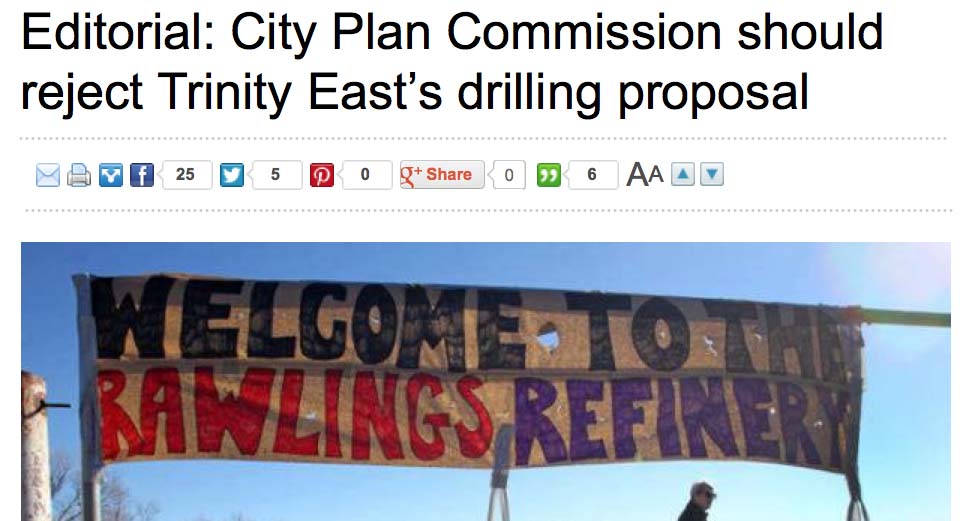 Win, lose or draw at Thursday's City Plan Commission vote, there is no question that, slowly, but surely, residents have built a consensus of public opposition to the Trinity East permits. For the latest proof, look no further than Wednesday's lead editorial in the Dallas Morning News advocating denial. It's the first time the paper has taken such a position. We know some of you can't get over the DMN paywall, so as a public service, here's the whole peice.
Win, lose or draw at Thursday's City Plan Commission vote, there is no question that, slowly, but surely, residents have built a consensus of public opposition to the Trinity East permits. For the latest proof, look no further than Wednesday's lead editorial in the Dallas Morning News advocating denial. It's the first time the paper has taken such a position. We know some of you can't get over the DMN paywall, so as a public service, here's the whole peice.
Groups Call for Full Open Public Hearing for Dallas Gas Permits Vote on Thursday
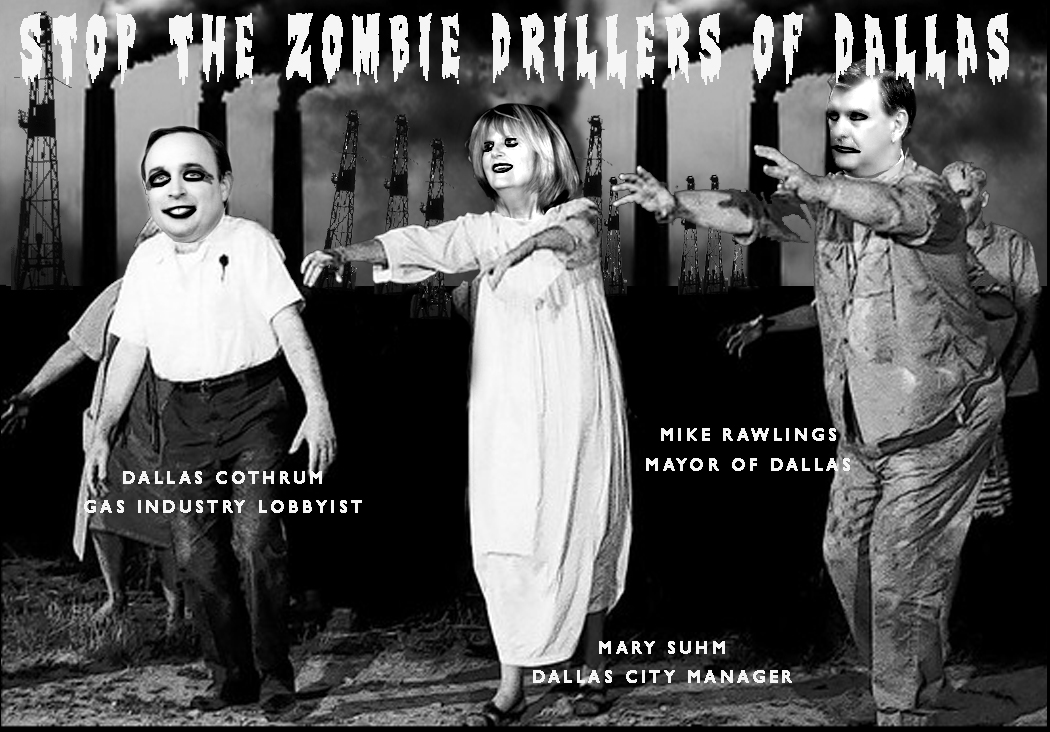 Here's the full text of a letter that was sent to all Dallas City Plan Commission members last week:
Here's the full text of a letter that was sent to all Dallas City Plan Commission members last week:
Commissioners and Chair,
Despite the request to the City Council made by members of the Commission on February 7th to change city policy in order to accommodate the Trinity East gas permits by your March 21st meeting, there has been no effort to do so.
For this reason alone, we urge you to take no action on these permits next week, or uphold your December 20th denial. These permits would allow surface drilling on park land and in floodplains, contrary to current city policy.
However, information and circumstances that have come to light since the December 20th vote to deny these permits make them even more objectionable.
We know that the proposed Trinity East processing facility and compressor station will be at least the 10th largest source of air pollution in the city, with a strong probability that emissions would grow to be much greater, out of the regulatory reach of the City of Dallas as they grow.
We know that city staff is working to locate this large air polluter next to the new Elm Fork Athletic Complex, in direct contradiction to recent city staff and City Council actions to protect the area around the Complex from lesser air pollution threats.
We know that, despite the title of the facility itself, the scale of operations, and the equipment it proposes to install, city staff refuses to classify Trinity East’s “Luna South Gas Processing Facility” as a gas processing facility under current City of Dallas zoning law.
We know that Trinity East misled the CPC at your February 7th meeting when its representative told you that gas well casings always protect underground aquifers. In fact, Trinity East had a casing failure at a previously undisclosed well in Irving, only a few miles away from the proposed Dallas sites, and with the City of Dallas participating in the lease agreement.
We know that on January 10th, Trinity East representatives told the Commission that its processing facility and compressor station would handle only the gas from its three Dallas sites—despite its Manager stating in published interviews that it was the centerpiece of a larger regional plan that incorporated Trinity East wells in at least two other cities.
We know that the city staff has a conflict of interest in performing an unbiased due diligence of the Trinity East permits because the City Manager had already pledged to support approval of the permits in a previously-undisclosed 2008 agreement. This is the reason there has not been a comprehensive review of the environmental and public health impacts of these permits by the City of Dallas staff, as there have been for other proposed polluting facilities in the same area as the Trinity East sites.
We know that a complaint has been filed with the Dallas County District Attorney’s Office alleging possible Open Meetings Act violations leading up to the January 10th CPC meeting that could make a second, “reconsidered” vote on the Trinity East permits illegal.
We know that a vote to approve these Trinity East permits is a vote condoning five years of the public, the Commission, the Park Board, and the City Council being intentionally mislead by the City Manager concerning the circumstances of these specific sites. It is perhaps the most important vote you will cast as a City of Dallas Plan Commissioner.
If you do decide to take a second vote on the Trinity East permits at your March 21st meeting, we request that you adopt special public hearing procedures that will guarantee a Dallas resident’s right to speak.
Based on the experience of the Commission’s February 7th meeting, the CPC format of 15-minutes per-side is clearly not adequate to allow everyone who wishes to give testimony on this high profile and controversial issue to be heard.
Because the CPC only meets during weekdays, many of us take off from our jobs or home responsibilities to attend. Our time should be respected. When a government entity announces a public hearing, it should be willing to listen to everyone who makes the effort to attend and speak. You owe us that courtesy.
The only time citizens have become angry during CPC meetings has been when they were completely shut-out of any opportunity to provide public comment (January 10th), and when public comment was shut down prematurely with many dozens of speakers still lined up to give testimony (February 7th). We make no apology in standing up for our right to speak out.
To avoid future frustrations, any definitive vote on the Trinity East permits taken on March 21st should be preceded by an inclusive, open-ended public hearing that gives each person their say. Toward that end, we propose that the CPC adopt the City Council rules for public hearing and allow everyone who wants to testify a total of 3 minutes each. The hearing would remain open until the last person spoke. Commission members would still be able to ask questions of specific presenters. This offers freedom of speech without sacrificing any of your tools to elicit further information from the participants.
We know that some of you must be as frustrated as ourselves in having to revisit this issue time and again, but there is a way to definitely put it to rest. Let the December 20th denial of the Trinity East permits stand.
Thank you for your consideration.
Raymond Crawford
Dallas Area Residents for Responsible Drilling
Jim Schermbeck
Downwinders at Risk
Sharon Wilson
Earthworks’ Oil & Gas Accountability Project
Marc McCord
FracDallas
Ed Meyer
Mountain Creek Neighborhood Alliance
Molly Rooke
Greater Dallas Chapter, Sierra Club
Zac Trahan
Texas Campaign for the Environment
Take a Tour of Dallas Gas Sites and Decide for Yourself if They’re Wasteland
(Dallas)—-A local clean air group released a short film of an official Dallas City Plan Commission tour of controversial gas drilling and production sites that it says rebuts the claims made by City Council members during last Wednesday's City Manager’s briefing on parkland drilling that the land is "desolate" and a "wasteland.”
Downwinders at Risk posted "Dallas Fracking Mystery Tour” early Tuesday morning for public viewing on its own website. It's a fast-paced four minute journal of a January 31st City Plan Dallas City Plan Commission bus tour of all three proposed Trinity East gas permit sites in Dallas: The Gun Club and the LB Houston/Luna Vista Golf Course drilling sites, both on city parkland, as well as the Luna Vista Processing Plant site, aka, "The Rawlings Refinery and Compressor Station," located only a short distance away from the City of Dallas' new Elm Fork Athletic Complex.
The group hired a local professional filmmaker to accompany the 15 Plan Commissioners, various city staff and members of the public on the half-day outing from the time they boarded two buses at City Hall to the last site visit, including question and answer sessions between Commissioners and David Cossum, the City of Dallas Assistant Director of Sustainable Development and Construction. The result is a quick take on each of the sites through the eyes of the tour participants.
“Contrary to claims by Council members who’ve never visited the sites they want to condemn, the Trinity River bottoms are not “wasteland,” said Jim Schermbeck, Director of Downwinders. “Even a quick look like this tour offered shows its never going to be mistaken for a Midland-Odessa oil patch.”
During last Wednesday’s briefing, Council member Sheffie Kadane compared the park land sites at the Gun Club and the Golf Course to West Texas oilfields, Council member Jerry Allen called them a “wasteland,” and Council member Dwaine Caraway said they didn’t represent “quality park land.” But looking at it the sites from the perspective of the Plan Commission tour, one sees expanses of hardwood forests, sculpted fairways, and a peacefully flowing Trinity River close-by.
Besides offering a striking visual counterpoint, the tour’s on-site Q&As between Plan Commission and City staff reveal other mistakes in drilling proponents’ claims about the sites. For example, Kadane has insisted there would never be drilling equipment in the actual flood plain, but as Cossum explains to an inquiring Commissioner, there will be.
Another Q&A at the refinery and compressor station site reveals City staff’s contradictory stances on sources of pollution surrounding the Elm Fork Athletic Complex – a new recreation facility expected to attract hundreds or thousands of children and their families on weekends.
The city is opposing a new permit from a near-by rock crushing facility permit because of concerns about its 17 tons of annual air pollution so close to the Complex, but supporting the construction of a gas refinery and compressor station that will admittedly release at least 75 tons a year of air pollution only 50 feet further away.
Using the Beatles’ “Magical Mystery Tour” as a recurring soundtrack, the short film uses no voice over narration, relying only on the comments of tour participants and text. It repeatedly asks why the city would contradict its own current policy, answering that “It was a Mystery” at the time of the tour.
However in a postscript, it adds the February 7th Dallas Observer publication of the 2008 “secret agreement” between Dallas City Manager and Trinity East to exchange funds for leases on city land for city staff help in approving drilling and production permits. “Suddenly, it wasn’t a mystery anymore.”
Schermbeck says his group hopes the film will put “a face on the sites” they haven’t had before, and offer a short, entertaining way to get educated about the controversy. “There’s been a lot of misinformation about these sites perpetrated by people who’ve never visited them. People can now see them the way the Plan Commission did and decide for themselves.“
A Dallas Drilling Scandal Primer
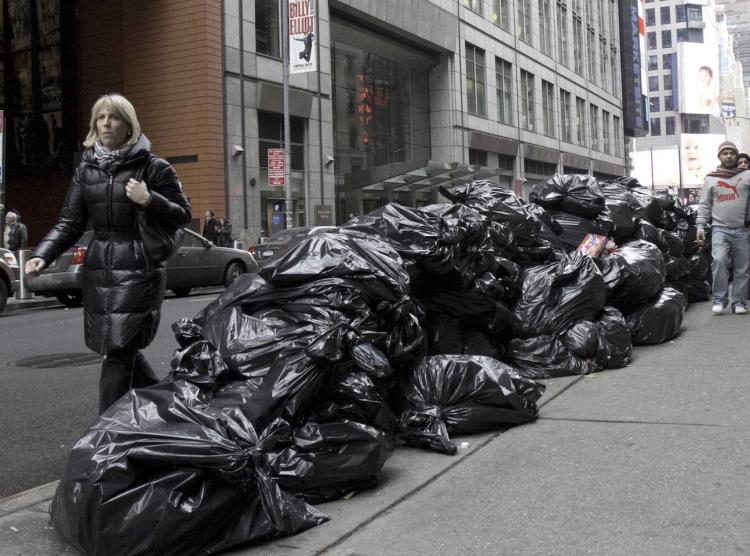 Thanks to everyone who turned out last Thursday for the (abbreviated) public hearing on the Trinity East "zombie" gas permits before the City Plan Commission. Our apologies to those of you who were not allowed to speak by the arbitrary too-soon ending of the hearing. It was one more example of a process gone off the rails when it comes to these permits.
Thanks to everyone who turned out last Thursday for the (abbreviated) public hearing on the Trinity East "zombie" gas permits before the City Plan Commission. Our apologies to those of you who were not allowed to speak by the arbitrary too-soon ending of the hearing. It was one more example of a process gone off the rails when it comes to these permits.
It's now clear that what began as a neighborhood-based effort to fight off irresponsible urban gas drilling three years ago has now grown into not only a turning point for the entire Dallas environmental movement, but as of last week, into the largest Dallas City Hall scandal in years as well. There are suddenly lots of moving parts. Here's a quick summary of what we know as of today.
On Thursday morning, the Dallas Observer broke the story that in 2008 Dallas City Manager Mary Suhm signed a secret side agreement with Trinity East that essentially turned City Hall into a lobbying machine for the company's gas permits. The first impact of that lobbying was a reversal of the no drill policy in Dallas parks. Only six months after city staff had told the Council and Park Board there would be no surface drilling in Dallas parks allowed, the side agreement Suhm negotiated with Trinity East assured the company that she and her staff were "reasonably confident" they could win permission to drill in parks for the company.
Many Dallas activists have speculated about such an agreement as the only way to explain why city staff seemed to be going out of its way to push through the Trinity East permits, including abruptly re-defining the current gas ordinance on the fly, ignoring or flouting precedents, and declining to bring the usual level of official scrutiny to bear. Suhm and city attorneys kept this document from public view even after years of opposition from neighborhood groups to drilling sites, including Trinity East's. At a time when every city staffer had an obligation to wear the Trinity East agreement on their sleeves, City Hall hid the fact they were working for the company to win its permit. Dallas Councilwoman Angela Hunt has prepared a detailed timeline of Suhm's deception.
Suhm declined to talk directly to the Observer, but instead issued a statement to the Morning News that said, in essence, she was shocked, shocked that anyone could think this side agreement with Trinity was a "back room" deal. Mayor Rawlings is standing by Suhm so far, issuing a statement of support late Thursday that emphasized the "non-binding" nature of the side deal that was "cut," as the Mayor so eloquently put it back in November. The Observer's Jim Schutze had a take down of both of their official statements on Friday, saying "some stuff just won't spin."
A growing chorus of groups and individuals are calling for Suhm to resign, as are some Council members like Hunt, and Scott Griggs. Her fate now seems linked to that of the Trinity East permits, since both seem tainted beyond redemption by the disclosure of the side deal. How can any resident or Council member trust what city staff says about the permits? How can any resident or Council member trust that Suhm won't sell them out again?
Meanwhile, the Observer has raised the possibility of Open Records Act violations by the City because it's pretty sure it asked for ALL documents related to the Trinity East permits. Citizens groups and individuals that have been turning in a constant flow of Open Records Act requests for the last three to four years might also have the same gripe.
But they'd have to take a number because four people, including Downwinders Director Jim Schermbeck, Zac Trahan of the Texas Campaign for the Environment, Raymond Crawford of Dallas Residents for Responsible Drilling, and Marc McCord of frackDallas went down to the District Attorney's office and filed a criminal complaint against the City Plan Commission Chair on Wednesday, alleging a violation of the Open Meetings Act prior to the January 10th vote to "reconsider" the Commission's denial of the permits. According to the complaint, Chair Joe Alcantar called members and lobbied them to vote for reconsideration in a practice called "daisy-chaining a quorum" that is explicitly against the law. If the charge is substantiated by an investigation, all subsequent decisions about the permits by the Commission could be invalidated. That would mean reverting back to the original December denial of the permits.
On the political front, John Carona, the Republican State Senator whose district includes the Elm Fork Soccer Complex, sent a letter to Mayor Rawlings, urging him to withdraw his support for the Gas Refinery and Compressor Station proposed for only 600 feet west of the Complex. Democrat State Representative Rep. Lon Burnam of Ft. Worth sent a similar letter, further isolating the Mayor politically.
In all, quite the "goat (act of procreation)", as the Observer's Brantley Hargrove labeled the whole Trinity East controversy last month.
What happens now?
Officially, the City Plan Commission put off any (legitimate or not) vote on the permits until its March 21st meeting. They have now specifically requested the Council deal with changing the current prohibitions against parkland and floodplain drilling before they're asked again to violate the law. So theoretically, the show now moves to the whole City Council, which has scheduled a 1:00 pm Wednesday, February 27th state-mandated public hearing on the city permanently removing park land from the city park system for drilling.
This same hearing has been scheduled twice before however, only to be canceled when the City Plan Commission didn't get around to doing what the Council couldn't bring itself to do first. Up to now the Mayor's strategy was to push the permits through the Plan Commission and Park Board to provide a cover for Council approval of drilling activity in parks and flood plains that's still not allowed. Apparently there's enough resentment about that among Plan Commission members for them to toss the hot potato back to the Mayor and Council. But it does so exactly as the Suhm memo hits and makes political support for the permits more tenuous.
We'll know soon whether the February 27th City Council hearing on turning over park lands to drilling is really on or not. Stay tuned.

